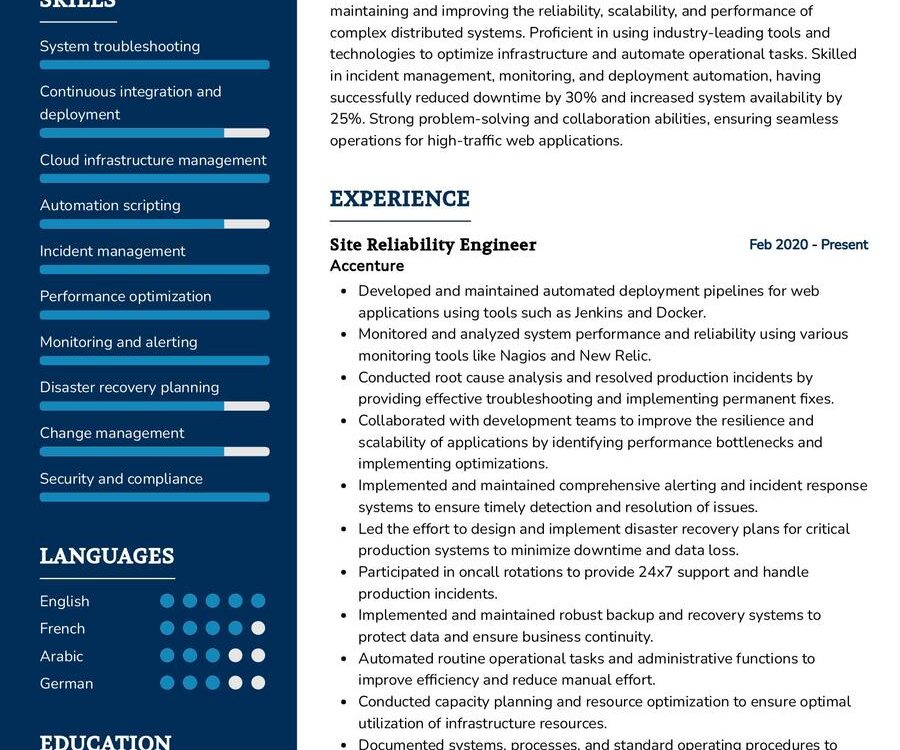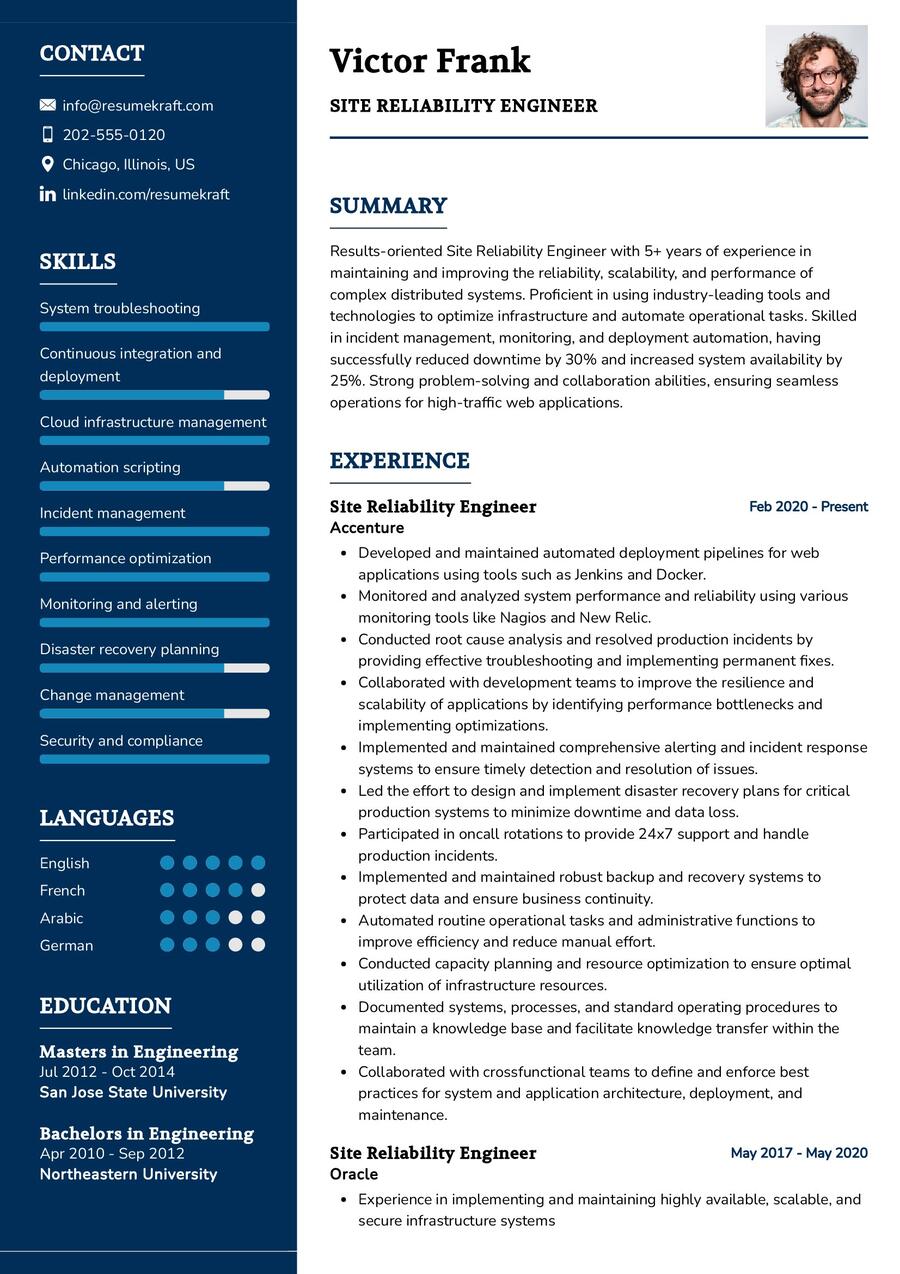Understanding the Role of a Site Reliability Engineer
In today’s rapidly evolving tech landscape, the role of a Site Reliability Engineer (SRE) holds a pivotal position in ensuring the robustness and reliability of digital platforms. This article explores the multifaceted responsibilities of an SRE, blending technical expertise with leadership skills to guarantee seamless operations. Let’s delve into the intricacies of this role, shedding light on how Site Reliability Engineers play a crucial part in maintaining a stable and efficient online environment.
Site Reliability Engineer Job Requirements
Embarking on a career as a Site Reliability Engineer demands a combination of skills and qualifications. This section outlines the key prerequisites for individuals aspiring to take on the challenges of an SRE role:
- A Bachelor’s or Master’s degree in Computer Science, Information Technology, or a related field, establishing a solid foundation in the technical domain.
- Expertise in system architecture, network protocols, and a deep understanding of cloud computing platforms.
- Hands-on experience with configuration management tools, emphasizing the ability to automate and streamline operational processes.
- Proficiency in scripting languages such as Python or Shell, essential for developing tools and scripts to enhance system reliability.
- Demonstrated experience in incident response and a proactive approach to identifying and resolving potential issues before they impact users.
- Strong communication and collaboration skills, as SREs often work closely with development, operations, and other cross-functional teams.
- Certifications in relevant technologies like AWS, Azure, or Google Cloud can enhance your profile in the competitive job market.
Continuous learning and staying updated with the latest trends in site reliability are crucial for aspiring Site Reliability Engineers.
Responsibilities of a Site Reliability Engineer
The role of a Site Reliability Engineer is dynamic and requires a combination of technical prowess and strategic thinking. Here, we break down the core responsibilities that define the day-to-day tasks of an SRE:
- Designing and implementing scalable and reliable infrastructure, ensuring high availability and optimal performance of web applications.
- Collaborating with development teams to integrate reliability and resilience into the software development lifecycle.
- Conducting post-incident reviews and root cause analysis to identify areas of improvement and prevent future system failures.
- Implementing monitoring and alerting systems to proactively identify and address potential issues.
- Automating routine tasks to streamline operations and reduce manual intervention, contributing to overall system efficiency.
- Participating in on-call rotations to provide 24/7 support and quick resolution of critical incidents.
- Ensuring compliance with industry standards and best practices in system reliability and security.
Each responsibility requires a blend of technical acumen, problem-solving skills, and a proactive approach to maintaining system reliability.
Site Reliability Engineer Resume Writing Tips
Crafting a compelling resume is essential for standing out in the competitive job market. Consider the following tips to effectively showcase your skills and experience as a Site Reliability Engineer:
- Highlight specific projects where you improved system reliability or implemented automation, quantifying the impact on operational efficiency.
- Showcase your experience in incident response, emphasizing your ability to analyze and resolve critical issues swiftly.
- Include relevant certifications and training programs, demonstrating your commitment to continuous learning and staying updated with industry best practices.
- Tailor your resume for the specific job by aligning your skills and achievements with the requirements outlined in the job description.
Your resume is not just a document; it’s a reflection of your expertise and a key tool in securing your desired SRE role.
Site Reliability Engineer Resume Summary Examples
Your resume summary serves as an introduction to your professional journey. Craft a powerful summary that encapsulates your skills and experience as a Site Reliability Engineer:
- “Results-driven Site Reliability Engineer with over 7 years of experience, adept at designing and implementing scalable infrastructure, reducing system downtimes by 30%.”
- “Proactive and detail-oriented SRE with a track record of successful incident response, leading to a 25% improvement in system reliability.”
- “Experienced Site Reliability Engineer with expertise in automation and cloud technologies, contributing to a 40% increase in overall operational efficiency.”
Your summary should be a concise yet impactful preview of your capabilities and achievements as an SRE.
Create a Strong Experience Section for Your Site Reliability Engineer Resume
Your experience section is the heart of your resume, showcasing the milestones and contributions throughout your career. Here are examples to guide you:
- “Led the implementation of automated monitoring systems, resulting in a 20% reduction in response time during critical incidents.”
- “Collaborated with development teams to implement chaos engineering practices, improving the system’s resilience to unexpected failures.”
- “Participated in on-call rotations, successfully resolving high-priority incidents and ensuring 99.9% uptime for critical applications.”
Your experience section should narrate the story of your career, highlighting your impact on system reliability and operational efficiency.
Sample Education Section for Your Site Reliability Engineer Resume
Your educational background is an essential aspect of your resume. Showcase your academic achievements and relevant certifications:
- Master of Science in Computer Engineering, XYZ University, 2015.
- Bachelor of Technology in Information Technology, ABC College, 2012.
- Google Cloud Professional – Site Reliability Engineer Certification, 2019.
Each qualification is a stepping stone, contributing to your expertise as a Site Reliability Engineer.
Site Reliability Engineer Skills for Your Resume
Your skill set is your toolkit, showcasing your abilities as a Site Reliability Engineer. Here’s a breakdown of essential soft and hard skills:
Soft Skills:
- Collaboration and teamwork, vital for working closely with cross-functional teams.
- Effective communication, ensuring clear conveyance of technical information and insights.
- Problem-solving abilities, crucial for identifying and resolving complex issues efficiently.
- Attention to detail, preventing oversights and ensuring system reliability.
- Adaptability and resilience, essential for navigating the ever-changing tech landscape.
Hard Skills:
- Expertise in cloud computing platforms (AWS, Azure, Google Cloud).
- Proficiency in scripting languages (Python, Shell) for automation and tool development.
- Configuration management using tools like Ansible or Puppet.
- Incident response and post-incident analysis.
- Monitoring and alerting system implementation.
Each skill is a tool in your arsenal, contributing to your effectiveness as a Site Reliability Engineer.
Common Mistakes to Avoid When Writing a Site Reliability Engineer Resume
Ensure your resume avoids common pitfalls that can hinder your chances of landing your dream SRE role:
- Avoid using generic language; tailor your resume to highlight your unique contributions and skills.
- Focus on achievements rather than just listing job duties, providing depth to your narrative.
- Don’t underestimate the importance of a cover letter; use it as an opportunity to connect with potential employers and convey your passion for site reliability.
- Balance technical jargon; ensure your resume is accessible to both technical and non-technical readers.
- Proofread thoroughly to maintain a professional image and avoid errors that could impact your credibility.
Each mistake is a potential roadblock; avoid them to create a resume that is both authentic and compelling.
Key Takeaways for Your Site Reliability Engineer Resume
As you conclude this comprehensive guide, remember the following key points while crafting your Site Reliability Engineer resume:
- Emphasize your impact on system reliability and operational efficiency in your experience section.
- Showcase your technical proficiency in cloud platforms, scripting languages, and automation tools.
- Highlight strategic initiatives you’ve led, such as implementing monitoring systems or collaborating on chaos engineering practices.
- Include a section on continuous learning, featuring certifications and training programs to demonstrate your commitment to staying current in the field.
Your resume is your professional story, painting a picture of your journey, skills, and aspirations as a Site Reliability Engineer. Best of luck!
Finally, feel free to utilize resources like AI Resume Builder, Resume Design, Resume Samples, Resume Examples, Resume Skills, Resume Help, Resume Synonyms, and Job Responsibilities to create a standout application and prepare for the Site Reliability Engineer job interview questions.


